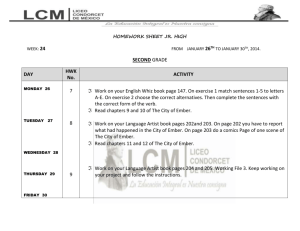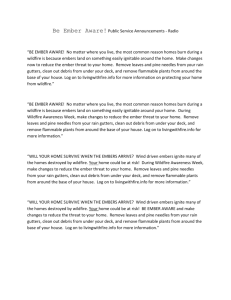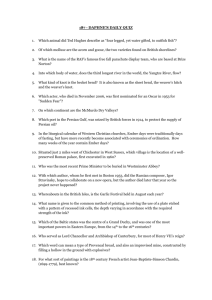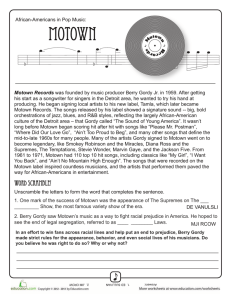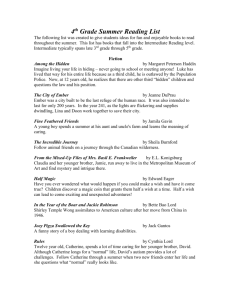Flaming Ember
advertisement
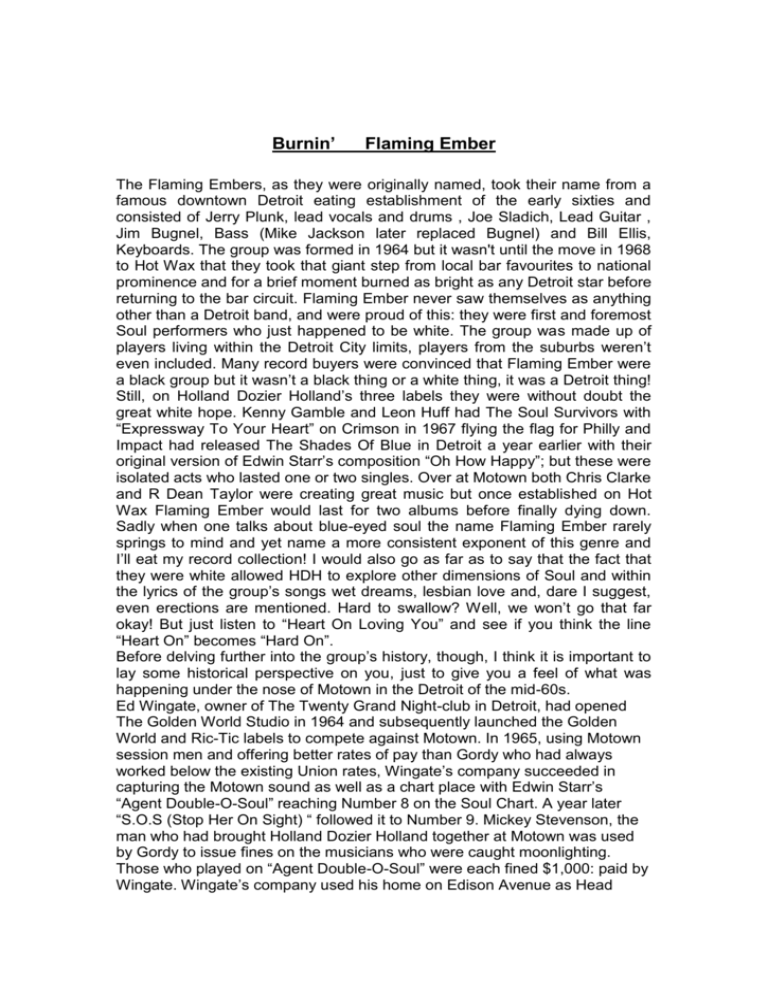
Burnin’ Flaming Ember The Flaming Embers, as they were originally named, took their name from a famous downtown Detroit eating establishment of the early sixties and consisted of Jerry Plunk, lead vocals and drums , Joe Sladich, Lead Guitar , Jim Bugnel, Bass (Mike Jackson later replaced Bugnel) and Bill Ellis, Keyboards. The group was formed in 1964 but it wasn't until the move in 1968 to Hot Wax that they took that giant step from local bar favourites to national prominence and for a brief moment burned as bright as any Detroit star before returning to the bar circuit. Flaming Ember never saw themselves as anything other than a Detroit band, and were proud of this: they were first and foremost Soul performers who just happened to be white. The group was made up of players living within the Detroit City limits, players from the suburbs weren’t even included. Many record buyers were convinced that Flaming Ember were a black group but it wasn’t a black thing or a white thing, it was a Detroit thing! Still, on Holland Dozier Holland’s three labels they were without doubt the great white hope. Kenny Gamble and Leon Huff had The Soul Survivors with “Expressway To Your Heart” on Crimson in 1967 flying the flag for Philly and Impact had released The Shades Of Blue in Detroit a year earlier with their original version of Edwin Starr’s composition “Oh How Happy”; but these were isolated acts who lasted one or two singles. Over at Motown both Chris Clarke and R Dean Taylor were creating great music but once established on Hot Wax Flaming Ember would last for two albums before finally dying down. Sadly when one talks about blue-eyed soul the name Flaming Ember rarely springs to mind and yet name a more consistent exponent of this genre and I’ll eat my record collection! I would also go as far as to say that the fact that they were white allowed HDH to explore other dimensions of Soul and within the lyrics of the group’s songs wet dreams, lesbian love and, dare I suggest, even erections are mentioned. Hard to swallow? Well, we won’t go that far okay! But just listen to “Heart On Loving You” and see if you think the line “Heart On” becomes “Hard On”. Before delving further into the group’s history, though, I think it is important to lay some historical perspective on you, just to give you a feel of what was happening under the nose of Motown in the Detroit of the mid-60s. Ed Wingate, owner of The Twenty Grand Night-club in Detroit, had opened The Golden World Studio in 1964 and subsequently launched the Golden World and Ric-Tic labels to compete against Motown. In 1965, using Motown session men and offering better rates of pay than Gordy who had always worked below the existing Union rates, Wingate’s company succeeded in capturing the Motown sound as well as a chart place with Edwin Starr’s “Agent Double-O-Soul” reaching Number 8 on the Soul Chart. A year later “S.O.S (Stop Her On Sight) “ followed it to Number 9. Mickey Stevenson, the man who had brought Holland Dozier Holland together at Motown was used by Gordy to issue fines on the musicians who were caught moonlighting. Those who played on “Agent Double-O-Soul” were each fined $1,000: paid by Wingate. Wingate’s company used his home on Edison Avenue as Head Office and here he would work with a modest staff of six and with a roster of artists and writers that included Laura Lee, Steve Mancha/Clyde Wilson, The Parliaments, Norma Toney, Eddie Anderson, Melvin Davis and The Flaming Embers. All of whom would find their way to Cadillac Towers, home of Invictus and Hot Wax. Prior to all of this The Flaming Embers recorded one single on the Fortune label, "You Can Count on Me" / " Gone, Gone, Gone" (Fortune 889). And as well as this single they also backed Paul London on " Don't Believe Anybody". On the strength of these tracks they were signed by Wingate for a short period to the Ric-Tic label. They started their Ric-Tic career in 1967 with “Let’s Have A Love-In” Ric-Tic 129 backed by the instrumental version by Wingate’s Love-In Strings reflecting the nation’s mood whilst expressing lyrics usually avoided in the usual Soul recordings, something the group would return to once established at Hot Wax. So popular, seemingly, was the instrumental ‘B’ side that it was re-released as the ‘A’ side two records later with “She’s A Real Livewire “ by The Flaming Embers being relegated to the ‘B’ side, again in 1967. Amazingly ... the next Ric-Tic release was “Let’s Have A Love-In” by The Flaming Embers backed by the George Clinton song, “Hey Mama, What’cha Got For Daddy” still in 1967. Ed Wingate, owner of Ric-Tic appeared to be preparing the group for what was to come once under the wings of Holland Dozier Holland.... confusion, with ‘A’ sides being relegated or replaced on new releases. Move now to Ric-Tic 140 a year later and “Bless You”, a most pleasant mid-tempo item full of pathos and the unique vocal delivery of group leader Jerry Plunk with the equally lilting instrumental ‘B’ side supporting the release more than adequately. Ric-Tic 143 belonged to The Flaming Embers with “Children” (1968) and the final Ric-Tic release Catalogue Number 145, “Just Like Children” backed by “Tell It Like It Is”, the Aaron Neville standard was also Flaming Embers again in 1968. The end of Ric-Tic and Golden World began in 1967 in a business deal that did little to endear Berry Gordy Jr to his own artists. Wingate decided to sell up, possibly brought about by increasing difficulty in getting distributors to deal with the smaller independent label when Berry Gordy was offering more lucrative returns. Gordy, ‘sensing’ this problem, chose to buy the product but not the labels and in so doing crushed any opposition to the Motown stranglehold. The Golden World studio was turned into Motown studio B and was considered the best studio in Detroit for recording orchestrated pieces. Before the year ended The Flaming Embers had dropped ‘The’ and ‘s’ and signed to Hot Wax. Flaming Ember had launched into a relatively comfortable groove with their initial Hot Wax release, the easy going ballad “Mind Body & Soul” in November 1969. The record peaked at Number One in Detroit whilst earning the group their first Gold single. The follow up Hot Wax single, though, was the one with which the group would gain immortality; “Westbound Number 9” This saw them into May, 1970 and was followed by their second strongest release, “I’m Not By Brother’s Keeper” in October. The ‘B’ side of “Keeper” was a non-album gem, “Deserted Village” written by former Motown and Fortune staff writer/producer William Weatherspoon. Weatherspoon had helped to give Jimmy Ruffin a career through such classics as “What Becomes Of The Brokenhearted” before joining up with HDH. “Westbound Number 9” also became the first single to be released on the British Hot Wax label. Both these singles hit the R&B Top Twenty and gained them further national exposure, which included appearances on television’s American Bandstand in 1970. Flaming Ember's "Westbound Number 9" Album was issued in the UK along with their second single, not off the album, the aforementioned "I'm Not My Brother's Keeper" but without the haunting 'B' side. At the same time America received their newest single "Stop The World And Let Me Off" with its risky lyrics of lesbian love between the singer's girlfriend and her girlfriend! More album tracks appeared as singles in America with Flaming Ember's "Shades Of Green" being the latest in a long line. Also in the UK Flaming Ember's "Stop The World And Let Me Off" was demoted to the 'B' side making way for the ballad "Shades Of Green". Two weeks later a reverse was made and "Stop…" was promoted but to no avail. Over Stateside the group had a new single in the form of "Sunshine", a schmaltzy ballad that contained lyrics that are now amazingly relevant as the musical world spins in time with the turntables: “She watches football but she prefers Tom Jones” Well who could blame the girl! That aside the melody was quite beautiful courtesy once again of William Weatherspoon, hence similarities to the work of Jimmy Ruffin. Weatherspoon, as mentioned earlier, had also worked for the local Fortune label ( the same label that had seen the first Flaming Ember release) prior to his Motown days where he produced amongst others Nathaniel Mayer's "Village Of Love". The "Sunshine" album by Flaming Ember was released in America but was never seen by British collectors. Like other albums from the company it unfortunately also contained tracks from the previous set. Here two tracks re-surfaced but amongst the newer tracks "One Step Beyond" written by the ever-reliable team of Johnson/Bond/Perry and "1200 Miles From Heaven" with its anti-war sentiments stood out as the most intriguing. By May of 1971 Blues & Soul Magazine in England announced its Poll Results. "Band Of Gold" was voted top single whilst "Give Me Just A Little More Time" was second. Further down the list Flaming Ember were smouldering at Number 33 with "Westbound Number 9". With the inclusion of the initial UK releases on Honey Cone and 100 Proof Aged In Soul the organisation's first five major releases had all made the grade with the British record buying public despite the fact that only Freda Payne and the Chairmen charted. Remarkably Hot Wax would never have a single Commercial success over here! In America "Bring The Boys Home" had gone Gold and along the way had also become the label's most controversial release outside of songs like "The Medal" by Ruth Copeland and "1200 Miles From Heaven" by Flaming Ember that also covered the Vietnam War. The difference was that both Copeland and Flaming Ember were not the high profile artists that Freda Payne was and so failed to court controversy to the same extent. In November it was rumoured that Flaming Ember were burned out, even so Hot Wax issued "If It's Good To You", a Holland Dozier Holland composition. England got the instrumental 'B' side only while the 'A' side belonged to an old track from their debut set, "The Empty Crowded Room", again courtesy of William Weatherspoon. Despite the group's releases on both sides of the Atlantic the rumour of their demise was true. Flaming Ember died down never to rise again although after a brief rest, Plunk and Ellis bounced back with a reformed group, Mind Body and Soul, in the spirit of Flaming Ember and named after their very first Hot Wax release. An album was recorded but never released and the group continued playing throughout the Metro Detroit area up to the late seventies. So here you are, twenty some years later holding some of Detroit’s hottest sounds in your hands. May I suggest that before it blisters, that you place it in your CD player, sit down......if you can, and listen to a group that by name and definition made Hot Wax smoke. Howard Priestley, June, 1999 Taken from the unpublished history of HDH- Love Factory
